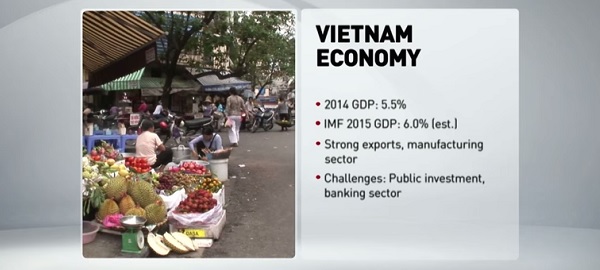Vietnam is one of the successes of Asia with consistently high GDP growth, strong exports and manufacturing sector, and a growing openness to business. Though it also faces challenges, especially in the public and financial sectors, Vietnam has many underlying strengths in support of very positive long-term perspectives.
Marc Mealy, Vice-President of policy at the US-ASEAN business council, is interviewed by CCTV to present some insights on the Vietnamese economy.
Key strengths of Vietnam
International trade and attractivity
Even though Vietnam has a communist government, its policy is clearly set towards enhancing a market-oriented economy as Vietnam is aiming at the “Emerging Market” status. This strong commitment has allowed Vietnam to achieve great successes:
- it has become a leader in the export of several agricultural commodities, such as rice, coffee or rubber,
- it receisve large investments for manufacturing in the electonics sector, notably from Samsung,
- it develops its exports to the US, but also to Europe and China.
The US and Vietnam have rapidly normalized and developed their relations in the recent past after their terrible conflict. Their cooperation advances in several domains, such as economy, defense, nuclear energy and with the Trans-Pacific Partnership – TPP – negociations on a free-trade agreement with several bordering countries of the Pacific Ocean.
The Vietnamese population
The Vietnamese are very driven and motivated to become entrepreneurs and start their own companies. This entrepreneurial dynamism attracts investors and venture capitalists, allowing several small and medium sized entreprises to flourish and a tech startup community to come to light.
This comes as an enhancer of strong demographic characteristics of the Vietnamese population. Not only are the 93 million Vietnamese rather young, with a large portion under 35 years old, but the underlying rural exodus also presses for the development of urban areas, generating demand for new products and services.
The Vietnamese government has directed investment towards education and vocational training, and many Vietnamese also study in foreign schools and universities in Vietnam or abroad. This move has allwed the development of talent and attracted investments in higher value-added industries.
Challenges of Vietnam
Despite these very positive aspects, Vietnam does also faces some challenges that hinder its economy:
- State-owned entreprises need to be reformed
- The financial sector needs to become freer and more transparent
- Certain closed industries need to open up to more competition and foreign investments
- Education and infrastructures investments need to grow further
- Social safety nets will need to be implemented
- Even though the government is tackling these issues, it is sometimes criticized for not doing it fast enough
Yet these challenges only throw a few shades on the otherwise positive financial and economic outlook of Vietnam for the long-run. Furthermore, the growing involvement of Vietnam in international trade bodies, such as the World Trade Organization, or multilateral agreements, such as the TPP, pushes the government to take care of these challenges.
Video from April 2015 by CCTV America









